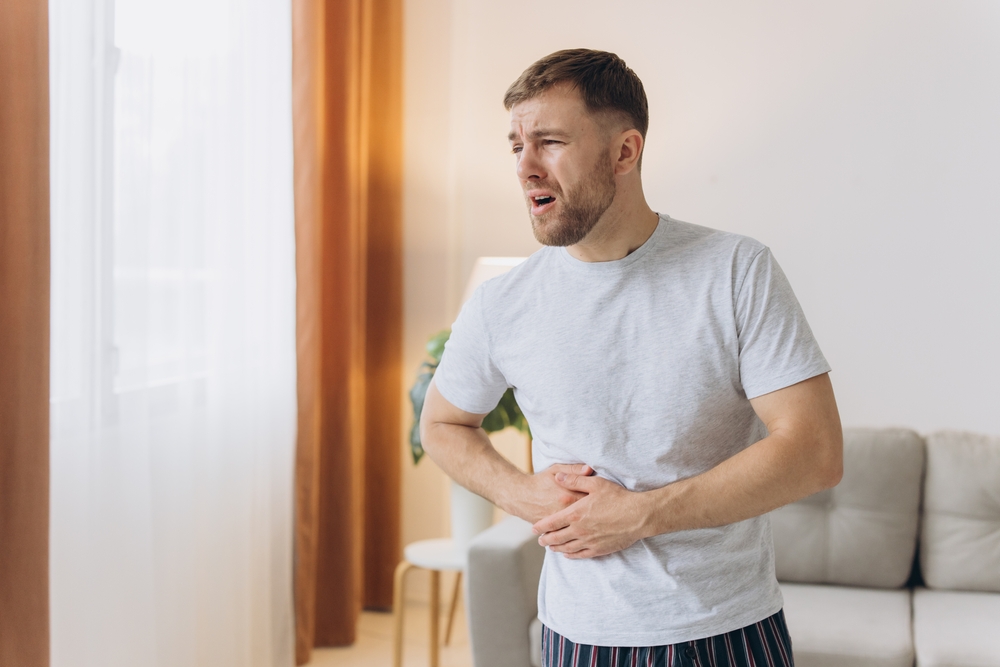
Last Updated:
May 8th, 2025
Drinking alcohol has a plethora of effects on our entire body, with some of the most prevalent being on our stomach. Being the source of energy intake, our stomach is one of the most critical organs to take care of.
So, what are the mechanisms behind alcohol that cause discomfort and pain in our stomachs after drinking? We look at the ways drinking can lead to stomach issues, some of which can be indicators of serious underlying health conditions.
What are the common symptoms of alcohol abuse?
Prolonged and heavy alcohol use presents a myriad of symptoms that range in severity. Symptoms will depend on many variables, including the frequency and volume of alcohol consumed, blood alcohol levels and developed tolerance. Therefore, recognising the signs and symptoms of alcohol use and abuse in another person can be difficult.
Some of the most common physical symptoms of alcohol use and addiction include:
- Broken or unsettled sleep
- Fluctuating heart rates or tachycardia (rapid heart rate)
- Increased risk of heart attack or stroke
- Increased risk of type 2 diabetes
- Memory blackouts
- Cirrhosis of the liver
- Alcohol-induced cardiomyopathy (heart difficulties in pumping blood)
There are many more associated symptoms, as research shows how misusing alcohol impacts nearly every single organ in the human body.
Yet some of the most devastating damage is caused in the stomach and gut areas of the body. Symptoms of alcohol misuse and addiction associated with the stomach and gut include:
- Diarrhoea
- Vomiting and nausea
- Irritated bowels
- Increased risk of digestive system cancer
- Weight gain
- Abdominal pain
- Hearburn
What kind of stomach problems stem from alcohol use?
Your stomach is one part of the greater system that digests food. It absorbs the nutrition your body needs and eventually gets rid of the waste. The functioning of this critical system can be impaired by alcohol in many ways, including:
Gastritis
Gastritis is a specific condition linked with prolonged alcohol abuse. It happens when the lining of your stomach becomes irritated or inflamed. Suffering from gastritis results in pain, sickness and severe indigestion.
Symptoms of gastritis include:
- Sharp stomach pains
- Feeling full and bloated
- Nausea and vomiting
- Lowered appetite
- Excessive gas
- Blood in faeces or vomit (from bleeding in the stomach lining)
These symptoms of gastritis may come on suddenly and severely (acute gastritis) or persist over long periods (chronic gastritis).
While some symptoms can feel mild, they may be signs of a serious problem. Less severe forms of gastritis can be helped by making healthy changes to your diet and lifestyle, including drinking less alcohol. However, persistent symptoms of gastritis can lead to the development of polyps (small growths) and even cancerous tumours in the stomach.

Stomach ulcers
For a person who regularly drinks large amounts of alcohol, there’s a greater risk of developing stomach ulcers. According to a 2020 animal study, excessive drinking can cause gastric erosion, which can contribute to the development of stomach ulcers. However, the NHS states that the evidence of alcohol causing stomach ulcers is weak. They claim that lifestyle factors may make stomach ulcer symptoms worse, but smoking is a greater contributor to developing stomach ulcers.
Considering that many people are more likely to smoke when drinking, we can see suggestions that increasing amounts of alcohol over the long term (and subsequently smoking more) can be associated with higher rates of stomach ulcers.
Acid reflux and burning sensations
Frequent drinking of alcohol is linked with symptoms of acid reflux and heartburn. While occasional heartburn can be relatively common, recurring and severe burning sensations can be a sign of gastroesophageal reflux disease (GERD).
When you drink alcohol, the lower part of your oesophagus, known as the oesophageal sphincter, is affected. It becomes more relaxed and doesn’t function as optimally as when not drinking. This is why many people experience acid reflux or heartburn after drinking.
While this can be mild for some, repeated acid reflux can develop into more dangerous conditions, such as Barrett’s oesophagus throat cancer and may require surgery.
Further problems in the digestive system and the gut
Aside from the previously mentioned ways alcohol addiction can damage your stomach, there are other, broader ways that drinking causes problems in the larger digestive system, including your gut. These can include:
- Excessive bloating: Many people suffering from alcohol addiction frequently experience uncomfortable, bloated sensations. This is mainly caused by alcohol disrupting the digestion of sugars in the body and the balance of bacteria in your gut. Research claims that excessive alcohol consumption leads to a shift in the “fungal diversity” of your gut. A yeast called candida increases, increasing gas production in the stomach and leads to the uncomfortable bloated sensation.
- Recurring diarrhoea: Every person’s gut needs a healthy balance of both good and bad bacteria. Alcohol causes a disturbance in that pattern, increasing bacteria that cause inflammation while decreasing the bacteria that aid digestion. Excessive bad bacteria in the gut can lead to a condition known as “leaky gut,” where gaps in the intestinal wall leak bacteria and other toxins into the bloodstream. This can lead to painful stomach sensations and diarrhoea for many people.
- Liver and pancreas damage: Both the liver and pancreas can be severely damaged from excessive alcohol consumption. Too much alcohol causes fat to build up in the liver, known as “fatty liver disease” or alcoholic steatohepatitis. For the pancreas, research shows that people who have four to five drinks a day are likely to develop alcohol-induced pancreatitis. This life-threatening condition means that enzymes that are usually released in the digestive tract build up inside the pancreas, eventually leading to the pancreas “digesting” itself. Damage to both the liver and pancreas can result in extreme digestive problems if left untreated.
How can I ease alcohol-related stomach pains?
If you’ve experienced mild to severe stomach pains and believe it stems from drinking, it is important to seek medical help. While some symptoms may not be cause for immediate concern, many alcohol-related stomach pains are the first stage to deeper, more serious problems.
The first and most obvious way of reducing the likelihood of stomach pains is to reduce or stop the consumption of alcohol. DrinkAware recommends not exceeding more than 14 units of alcohol per week and also avoiding binge drinking. In addition, your overall stomach strength will also be strengthened by the cessation of smoking or drugs like cocaine, both linked with damaging the stomach.
You can take steps to improve your dietary habits and avoid foods that may worsen acute abdominal pain, such as very spicy or acidic foods. Positive improvements in lifestyle and habits can also affect your stomach health. Research indicates that stress and anxiety alone may not cause damage to your stomach, but they can, in fact, flare symptoms such as constipation, bloating and diarrhoea.
If you feel your stomach is severely affected every time you drink, it will be beneficial to ask your doctor to test for alcoholic gastritis. They may take a blood test, stool sample or endoscopy to look at the overall health of your stomach and gut and propose medications and dietary changes to help ease painful symptoms.
I need help removing alcohol from my life
If drinking affects your health, especially your stomach, it may be a sign that alcohol is taking too much from your life. If you need help or support getting out of an alcohol addiction or alcohol use disorder, it can be hard to take the first step. We want you to know that we’re here for you.
Reach out to us today to take the first step on your recovery journey, free from alcohol addiction.
(Click here to see works cited)
- “Alcohol and Heart Disease: What Are the Risks?” British Heart Foundation, British Heart Foundation, 3 June 2025, www.bhf.org.uk/informationsupport/heart-matters-magazine/medical/effects-of-alcohol-on-your-heart.
- Shaaban A, Gangwani MK, Pendela VS, et al. Alcoholic Cardiomyopathy. [Updated 2023 Aug 8]. In: StatPearls [Internet]. Treasure Island (FL): StatPearls Publishing; 2025 Jan-. Available from: https://www.ncbi.nlm.nih.gov/books/NBK513322/
- “Medical Complications: Common Alcohol-Related Concerns.” National Institute on Alcohol Abuse and Alcoholism, U.S. Department of Health and Human Services, www.niaaa.nih.gov/health-professionals-communities/core-resource-on-alcohol/medical-complications-common-alcohol-related-concerns
- “What Is Alcoholic Gastritis? Causes, Symptoms, Treatment.” WebMD, WebMD, www.webmd.com/mental-health/addiction/alcoholic-gastritis-overview
- Park H, Cho D, Huang E, Seo JY, Kim WG, Todorov SD, Ji Y, Holzapfel WH. Amelioration of Alcohol Induced Gastric Ulcers Through the Administration of Lactobacillus plantarum APSulloc 331261 Isolated From Green Tea. Front Microbiol. 2020 Mar 17;11:420. doi: 10.3389/fmicb.2020.00420. PMID: 32256476; PMCID: PMC7090068.
- NHS Choices, NHS, www.nhs.uk/conditions/stomach-ulcer/causes
- Clarrett DM, Hachem C. Gastroesophageal Reflux Disease (GERD). Mo Med. 2018 May-Jun;115(3):214-218. PMID: 30228725; PMCID: PMC6140167.
- “Barrett’s Esophagus – Niddk.” National Institute of Diabetes and Digestive and Kidney Diseases, U.S. Department of Health and Human Services, www.niddk.nih.gov/health-information/digestive-diseases/barretts-esophagus
- Yang AM, Inamine T, Hochrath K, Chen P, Wang L, Llorente C, Bluemel S, Hartmann P, Xu J, Koyama Y, Kisseleva T, Torralba MG, Moncera K, Beeri K, Chen CS, Freese K, Hellerbrand C, Lee SM, Hoffman HM, Mehal WZ, Garcia-Tsao G, Mutlu EA, Keshavarzian A, Brown GD, Ho SB, Bataller R, Stärkel P, Fouts DE, Schnabl B. Intestinal fungi contribute to development of alcoholic liver disease. J Clin Invest. 2017 Jun 30;127(7):2829-2841. doi: 10.1172/JCI90562. Epub 2017 May 22. PMID: 28530644; PMCID: PMC5490775.
- Gouveia, Allie. “Does a Leaky Gut Cause Disease?” UNC Health Talk, 10 June 2024, healthtalk.unchealthcare.org/does-a-leaky-gut-cause-disease/.
- “Steatohepatitis: Symptoms, Causes, Treatment, and Outlook.” Medical News Today, MediLexicon International, www.medicalnewstoday.com/articles/steatohepatitis
- Klochkov A, Kudaravalli P, Lim Y, et al. Alcoholic Pancreatitis. [Updated 2023 May 16]. In: StatPearls [Internet]. Treasure Island (FL): StatPearls Publishing; 2025 Jan-. Available from: https://www.ncbi.nlm.nih.gov/books/NBK537191/
- “Is Alcohol Harming Your Stomach?” Drinkaware, www.drinkaware.co.uk/facts/health-effects-of-alcohol/general-health-effects/is-alcohol-harming-your-stomach
- Nina Gupta, MD. “Stress-Related Stomach Pain: When to See a Doctor.” UChicago Medicine, UChicago Medicine, www.uchicagomedicine.org/forefront/gastrointestinal-articles/stress-stomach-pain-when-to-see-a-doctor

